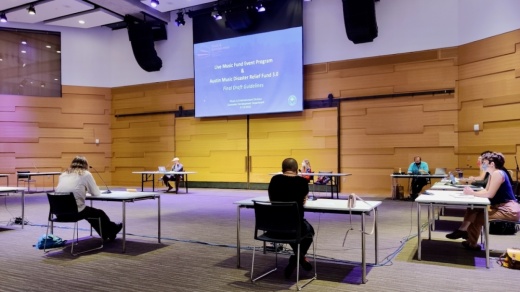The two $2.5 million initiatives—the Live Music Fund Event Program and Austin Music Disaster Relief Fund 3.0—have been in the works over the past several months at the city economic development department and with input from music commissioners.
The events program is designed to initially send between $5,000 and $10,000 to individual artists and bands for performances in the Austin area,. This is in addition to previous city pandemic recovery efforts with $2,000 grants available to music sector members experiencing income loss through the pandemic.
While the event support is new, an initial round of disaster relief funding that rolled out last year provided around $1.5 million to nearly 1,500 musicians citywide. The event support is directed through the city's hotel occupancy tax, or HOT-funded Live Music Fund while the stabilization fund was created through a portion of Austin's federal American Rescue Plan Act allocation.
The Music Commission's Sept. 13 session provided an overview of the finalized eligibility guidelines for both funds and how dollars will be distributed. Both opportunities were established with a city-backed goal of supporting members of some underrepresented Austin communities, with applicants identifying as Black, Indigenous, and people of color, or BIPOC, eligible to score higher on the rubric determining where dollars are sent. Musicians and contractors from the LGBT community, people with disabilities and women are also in line for a scoring boost.
“This is a historic decision that we're moving forward with and I’m excited to see the change that’s coming to the city," commission Chair Jonathan “Chaka” Mahone said. "The individuals that get this opportunity over the next three years, I think there’s going to be a handful of those folks that are going to change the entire culture of Austin."
Discussion between commissioners and city staff this week mainly centered on the eligibility and scoring details that will determine who can receive portions of the cultural funds. Some items of commission interest included broadened artist residency requirements, pay levels for participating musicians, and contractors and city support for navigating its application process.
The funds are nearly ready to go—applications could open in four to six weeks as soon as the programs are finalized—however, commissioners elected to delay the launches in order to fine-tune the management of the application process.
While a total of $5 million is being directed to the two funds, only around $4.6 million will end up going to musicians. The remainder will be reserved for the hiring of a third party to oversee the application process, an angle that commissioners requested further input on to ensure the selected administrator fits with community desires for the programs.
Before closing out their meeting, a majority of commissioners voted to form a working group tasked with examining the third-party contracting system set to open later this fall and whether both funds should be handled by the same entity. The Music Commission's next gathering is set to include an update on that process and a final review of the funds' applicant scorecards.





